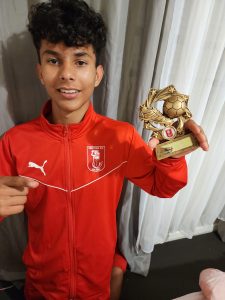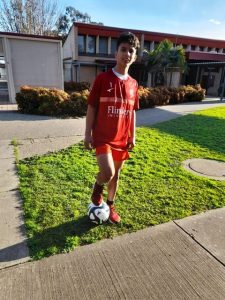Young refugee soccer star making his mark
When Aaron Reyes’ older brother was shot and killed as a bystander in an armed hold up, his family decided it was time to leave their home in Venezuela.
The 14-year-old was a promising soccer star in his homeland and is now making a mark as an elite junior player in Adelaide.
Aaron and his team from the Croydon Football Club, in Adelaide’s north, have just won the U14 JPL championship.
Aaron says soccer is his life and he hopes to make it his career.
“I enjoy playing football for sure. It’s everything to me and I want to become a professional player,” he said,
“I love the skills in the game and I love being part of a team. All of this comes together when you are successful as a team.
“And soccer has helped me settle in Adelaide. I have met people, and made friends and the soccer club and players have made me and family feel welcome,” Arron said.
 Aaron says he tries to emulate his hero, the Brazilian player Cristiano Ronaldo.
Aaron says he tries to emulate his hero, the Brazilian player Cristiano Ronaldo.
“I love Ronaldo. I love the way he moves and his skills on the ball,” he said.
Aaron and his mother and father arrived in Adelaide in February 2023.
The family fled their homeland amid escalating violence, political turmoil and an economic collapse.
“It was very dangerous for us in Venezuela. My family was not safe,” Aaron said.
“My older brother was killed. He was shot when he was on a bus. There was a hold up on the bus and a gunfight between a policeman and the man and my brother was shot accidentally.
“There were three people killed in the incident. That was when my family decided it was time to leave,” he said.
The family went to the Dominican Republic as refugees. They spent four and half difficult years there before coming to Australia on humanitarian visas in February, 2023, and were settled in Adelaide.
They are being supported by migrant and refugee settlement agency AMES Australia. Aaron has been enrolled in an English language school to improve his language skills before he enters the mainstream secondary system.
It was AMES staff member Steve Barker who noticed Aaron’s talents when they were living at the agency’s refugee accommodation and connected him with a local club.
“I noticed Aaron dong some elaborate tricks with a soccer ball. His English was not too bad, so I asked Aaron which team he supported, to which he replied, ‘I don’t have one I’m from Venezuela’,” Steve said.
“I said to him that he should support our local team Adelaide United. We recently had been given a donation of Adelaide United shirts and training jackets so I asked him to wait and sourced some from the office. He was thrilled and ran to tell his mum,” he said.
Stephen also sourced some tickets to the following weekend’s game.
“Aaron came back to the office to thank me and I asked him if he would like to go to the game. He was excited ran back to get his Mum,” Stephen said.
 Aaron and his family attended the game with other AMES refugee clients. The family met some of Adelaide United’s Spanish-speaking players as well as former Socceroo Craig Goodwin.
Aaron and his family attended the game with other AMES refugee clients. The family met some of Adelaide United’s Spanish-speaking players as well as former Socceroo Craig Goodwin.
Steve later connected him with the local Croydon Football Club where Aaron has become one of the rising stars.
More than five million people have fled Venezuela in recent years in what is the largest refugee crisis in the history of the Americas.
The South American nation has been caught in a downward spiral for years with growing political discontent further fuelled by skyrocketing hyperinflation, power cuts and shortages of food and medicine.
The UN says crime in Venezuela is widespread, with violent crimes such as murder and kidnapping increasing for several years.
In 2014, the UN attributed crime to the poor political and economic environment in the country—which, at the time, had the second highest murder rate in the world.
Rates of crime rapidly began to increase during President Nicolas Maduro’s predecessor Hugo Chavez’s tenure due to the institutional instability of his government, underfunding of police resources, and severe inequality.
Chávez’s government pursued a hard-line socialist agenda which promoted class conflict and social fragmentation, which led to increased crime, including robbery, murder and extortion.
Crime has increased under Maduro leading to Venezuela was being ranked among the most insecure nation in the world with 98 per cent of crimes going unpunished.
Venezuelans have also faced a worsening economic crisis and humanitarian emergency since 2014, and the country’s northern coasts have been particularly hard hit due to lack of tourism and the impact of organised crime on small-scale fishing.
A recent UN report says 2.5 million Venezuelans face severe food insecurity, and a third of the population needs food assistance.












